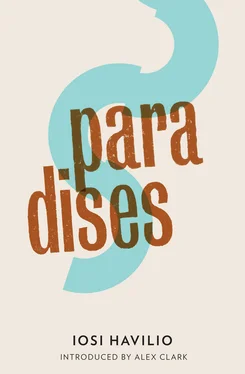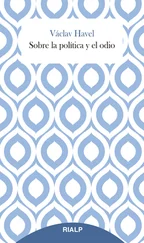Iosi Havilio - Paradises
Здесь есть возможность читать онлайн «Iosi Havilio - Paradises» весь текст электронной книги совершенно бесплатно (целиком полную версию без сокращений). В некоторых случаях можно слушать аудио, скачать через торрент в формате fb2 и присутствует краткое содержание. Год выпуска: 2013, Издательство: And Other Stories, Жанр: Современная проза, на английском языке. Описание произведения, (предисловие) а так же отзывы посетителей доступны на портале библиотеки ЛибКат.
- Название:Paradises
- Автор:
- Издательство:And Other Stories
- Жанр:
- Год:2013
- ISBN:нет данных
- Рейтинг книги:3 / 5. Голосов: 1
-
Избранное:Добавить в избранное
- Отзывы:
-
Ваша оценка:
- 60
- 1
- 2
- 3
- 4
- 5
Paradises: краткое содержание, описание и аннотация
Предлагаем к чтению аннотацию, описание, краткое содержание или предисловие (зависит от того, что написал сам автор книги «Paradises»). Если вы не нашли необходимую информацию о книге — напишите в комментариях, мы постараемся отыскать её.
is an almost perfect novel." — Albert Camus's
reimagined with a female lead in in twenty-first-century Buenos Aires.
Recently widowed, a young woman leaves the countryside for Buenos Aires with her four-year-old son where she seeks to build a new life for herself. She finds work in the zoo and moves into the human zoo of a squatted tower block at the invitation of one of its residents, to whom she acts as nurse, giving morphine injections.
Paradises — читать онлайн бесплатно полную книгу (весь текст) целиком
Ниже представлен текст книги, разбитый по страницам. Система сохранения места последней прочитанной страницы, позволяет с удобством читать онлайн бесплатно книгу «Paradises», без необходимости каждый раз заново искать на чём Вы остановились. Поставьте закладку, и сможете в любой момент перейти на страницу, на которой закончили чтение.
Интервал:
Закладка:
She coughs, clears her throat, rubs her hands together and emits a man’s voice: Let’s go for something stronger. From the kitchen to the living room. We put on the slippers and slide over to a false mappa mundi next to the piano, which Eloísa opens at Ecuador. Several bottles stand like fish out of water, mouths gaping. To calm me, she says: The fat cow went to visit family in Rosario, so the coast’s clear. She closes her eyes and her index finger leaps from cap to cap: Eeny meeny miny moe. We have the dregs of a cherry liqueur.
The bottle empties quickly, we move on to an imported whisky without letting chance intervene. Any idea how much this must cost? She pours two generous glasses which we clink together, To a new life, she says, and I smile thinking that she must have been repeating the phrase all this time. A good pet phrase. The first gulp burns my chest. All this preamble makes me think the plan will come to nothing. And indeed, for fun, and because they are to hand, we start rifling through the pile of vinyl records that Axel’s parents keep in a chest. Lots of jazz, some operas and a collection of messianic music: Paul Wilbur, Israel’s Hope, Torah Torah. We’re flummoxed by the needle and the speeds on the record player but then we manage to get it going. Eloísa dances alone, clapping between her legs tarantella style. Tosca and Syracuse. The Hassidic medley begins with a sugary prologue that makes Eloísa laugh like a madwoman.
Our eternal father lives; the heavens,
the earth, all creation exalts him.
The people of Israel live and, every Shabbat, recall
the miracle of creation and ask for peace and prosperity.
The Lord blesses you from Zion and shows you
the glory of Jerusalem of our days.
May your children’s children live to see
true peace in Israel.
At twelve-something we approach the staircase. Upstairs, she walks in front, I linger at the portraits hanging on the wall as if hoping to discover a secret. The hidden intrigue behind Axel’s family. I enter the bedroom and in the centre of the dressing room I see Eloísa frozen. Before speaking, as if no words were sufficient, she stretches out her arm and gestures across a shoeless shoe section: That fucking bitch. Certain that she’s joking, I smile. But no, she grabs her head, holding it between her hands as if it were about to come off. It’s no joke. The bloody idiot went and found out, she says, and points to a shelf above the rail holding the fur coats, the evening gowns and the sheathed suits: piles and piles of identical white boxes.
I say nothing but I think that perhaps Orfe put the shoes away in boxes because Axel’s mother asked her to. Or because she does it every so often to give the dressing room a thorough once-over. A cleaning routine. I keep quiet. Her mood quickly changes. Wait here, she says, and shoots off. I crouch down and sink my hand into that thick, soft carpet, like a slumbering beast. Eloísa returns with the bottle of whisky which we left unfinished, an ashtray and cigarettes. We split the task, sharing out the boxes, grabbing three each and putting them back in their places. Before we start, Eloísa reminds me: Red and shiny, spike heels. I wonder what must be going through her head at this point. What will push her to carry on. I can’t believe anyone could have so many shoes. After uncovering more than half the boxes and getting nowhere, Eloísa, who was initially taking the search as a game, begins to get annoyed. If I didn’t know her better, I’d say she was on the verge of crying. Let’s go again, she says. This time the command is to forget the red shoes, which are nowhere to be seen, and check the others one by one, sticking a hand inside, because if someone was suspicious they’ve more than likely put the key in a different place.
A first piece of carelessness, a box that Eloísa doesn’t bother to close, unleashes the chaos. It seems ridiculous to be tidy if she isn’t, so I join in. Once again we reach the end to no avail, but worse than before, the mountain of shoes that has formed between us, that brightly coloured monster with a thousand points, is the living image of delirium. It can’t be, she says, beginning to doubt herself. I had it in my hands only yesterday, I swear. And once more she rants about Orfe, who must have put everything away that same afternoon before leaving. I think perhaps she’s right when she says they found her out, or at least sensed something, and someone took care to hide those red shoes somewhere safe from Eloísa’s imagination.
We can still change what is yet to come, we’d have to calm down. Actually, I would have to calm Eloísa down, persuade her that it’s nonsense to persist with this, that it was a good idea, but fate didn’t want it that way and that’s it, we have to resign ourselves to it. Let’s forget about it, that’s what I would say. Then we’d have to start organising that cluster of shoes, matching pairs, returning the finest to their tissue paper, putting them away in the boxes, piling them on the shelf in rows of three, the way we found them, and carry on getting drunk with no further pretensions. In her anger, incapable of dealing with her frustration any other way, as I mentally rehearse a short speech of persuasion, Eloísa grabs a shoe by the heel, the one closest to her, a suede number, and vents her fury by flinging it through the air. She is, we are, unlucky that the shoe hits the mirror, which breaks the way mirrors break, weaving spider webs without actually falling to pieces. Now there’s no going back. That must be why, after a silence that lasts the time it takes Eloísa to form a big, silent Oo, we end up laughing at the absurdity.
Come on, she says. She comes unhinged. She flies downstairs not looking where she’s putting her feet, defying gravity, on the verge of an accident. I follow a few metres behind, ornaments whirl across my path, including the urn containing Axel’s grandfather’s ashes, which scatter over the carpet. She doesn’t even turn round, she enters the kitchen and carries on to the basement. But instead of heading for the games room, she opens a small door camouflaged against the colour of the wall: the maid’s room. Unstoppable, Eloísa starts going through Orfe’s bedroom, swiping blindly, with no real intention of finding anything. Only anger. She opens boxes, hurls clothes over the floor, lifts the mattress, she shows no mercy to a knitted crucifix which she unthreads angrily, she breaks everything she can. On the sidelines, leaning against the doorframe, seeing her in action, I can’t find the words to object. I pick up an old ID covered in leather that lands on the floor next to my feet. In the photo, Orfelina de los Milagros, that’s her full name, has a cheeky, embarrassed smile, her hair tied tightly back, a white blouse with flounces and a tartan V-necked sweater. I can’t and don’t want to think about Orfe’s life, about the way she’s always been, but I can’t help letting myself be swayed. Before abandoning the room, when there’s nothing left to rip apart, Eloísa lights a match and threatens to burn it all.
It’s half three and we are still on an uncontrolled merry-go-round. The alcohol and the hours of madness could make my eyelids droop at any moment. Eloísa is pale, sweaty, she smokes without pause. The plant tattooed on her arm changes colour, from green to black. As if she were going to die. We empty half the bar, we annihilate two bottles of whisky, a half-litre of vodka and one of anisette. Sitting on the armchair in the living room, I fantasise that the remains of Axel’s grandfather are resuscitating in search of revenge. I avoid looking at the floor.
What comes next is difficult to relate. Or not to relate but to remember, to give some logical order to. Once again we go upstairs and, faced with the chaos in the dressing room, Eloísa is going to kick doors, smash two bottles of perfume against the wall, pee on the carpet, and I, somewhere between incredulity and fright, have an epiphany. On a partially hidden shelf, on a different level from the rest, I discover about ten shoeboxes we haven’t checked. For an instant I don’t know what to do, whether to stay silent or cherish one last chance. I’m leaning towards the latter in the hope that everything will be over quickly. Look, I say, and Eloísa pounces on the boxes, causing a landslide. The red shoe, of course, shiny, spike heels, comes to light. Once the euphoria passes, key in hand, Eloísa takes down the broken mirror, which ends up shattering into pieces the minute she rests it on the floor, and opens the safe effortlessly.
Читать дальшеИнтервал:
Закладка:
Похожие книги на «Paradises»
Представляем Вашему вниманию похожие книги на «Paradises» списком для выбора. Мы отобрали схожую по названию и смыслу литературу в надежде предоставить читателям больше вариантов отыскать новые, интересные, ещё непрочитанные произведения.
Обсуждение, отзывы о книге «Paradises» и просто собственные мнения читателей. Оставьте ваши комментарии, напишите, что Вы думаете о произведении, его смысле или главных героях. Укажите что конкретно понравилось, а что нет, и почему Вы так считаете.











